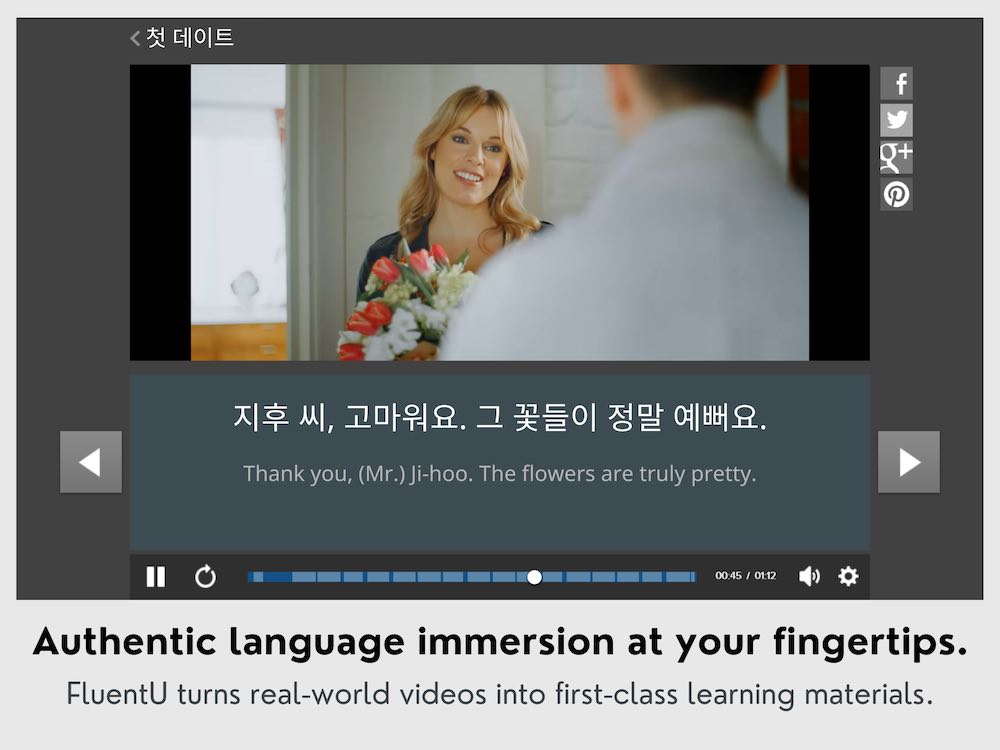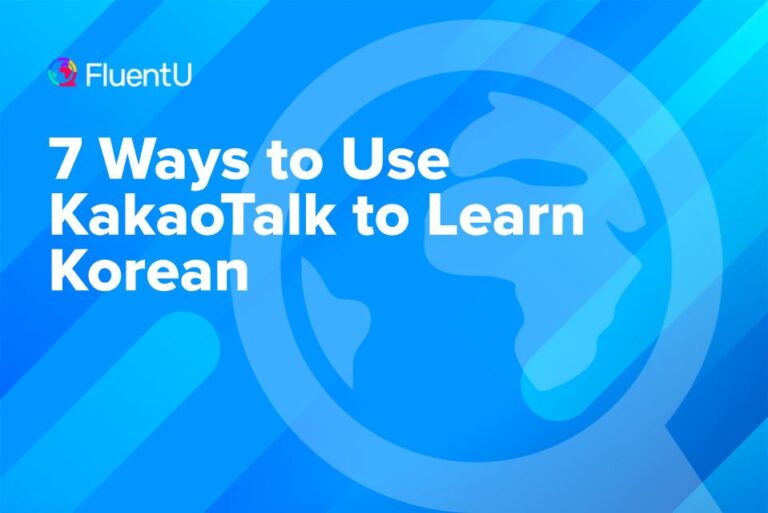Contents
- 1. 한국어 할 수 있습니까? (Hangugeo hal su isseumnikka?) — Do you speak Korean?
- 2. 영어 할 수 있습니까? (Yeongeo hal su isseumnikka?) — Do you speak English?
- 3. 어떻게 지내세요? (Eotteoke jinaeseyo?) — How are you?
- 4. 몇 살이세요? (Myeot sariseyo?) — How old are you?
- 5. 무슨 뜻이에요? (Museun tteusieyo?) — What does this mean?
- 6. 이름이 뭐예요? (Ireumi mwoyeyo?) — What’s your name?
- 7. 어디 출신이세요? (Eodi chulsiniseyo?) — Where are you from?
- 8. 어디에서 일해요? (Eodieseo ilhaeyo?) — Where do you work?
- 9. 어떤 음악을 좋아해요? (Eotteon eumag eul johahaeyo?) — What music do you like?
- 10. 시간 있을 때 뭐 하세요? (Sigan isseul ttae mwo haseyo?) — What do you do when you have free time?
- How Can Korean Conversation Starters Help Me Connect with Others?
- And One More Thing...
Korean Conversation: 10 Basic Ways to Start a Dialogue with Native Speakers
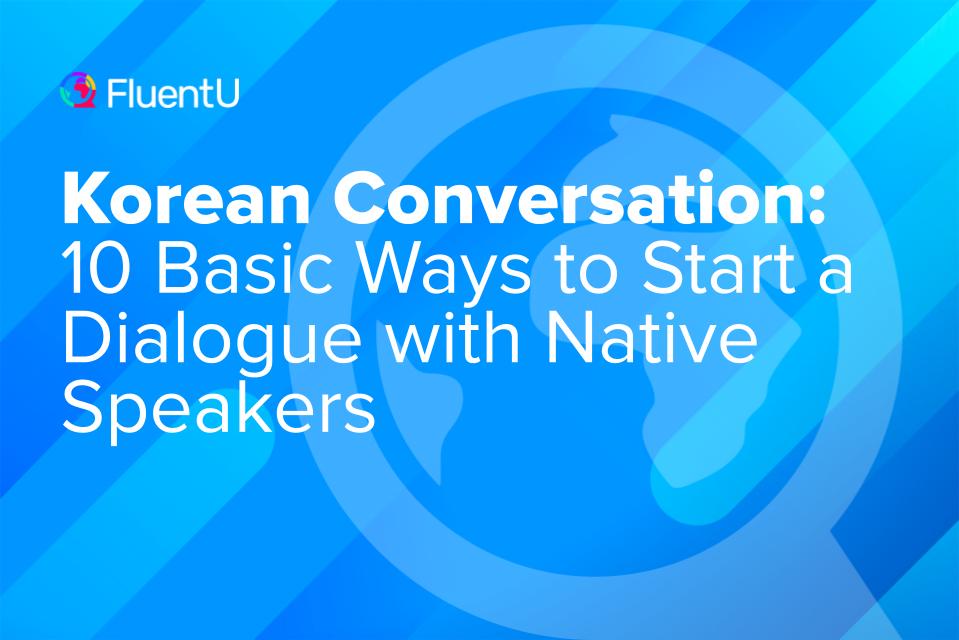
You don’t have to be fluent in Korean to connect with native speakers.
Although understanding things like the Korean alphabet and more complex grammar concepts will make having a conversation easier, you can absolutely get by if you just memorize a few simple Korean phrases for conversations.
Memorize these conversation starters in this post and perhaps some possible responses will make your future Korean dialogues flow with greater ease.
If you’re more of a visual learner, you can also learn the same phrases in our video lesson below:
Download: This blog post is available as a convenient and portable PDF that you can take anywhere. Click here to get a copy. (Download)
1. 한국어 할 수 있습니까? (Hangugeo hal su isseumnikka?) — Do you speak Korean?
This one is a great opener that helps you get a feel for who you’re talking with. Plus, a native Korean speaker could take this as a cue that you’d like to exercise your Korean language skills with them.
Alternatively, if you’re in a friendly, informal atmosphere, you could open with 한국어? (hangug-eo?) — “Korean?”
A note: It would be wise to use this opener specifically when you’re in South Korea, where it would make sense to assume that someone might speak Korean. You probably shouldn’t approach a stranger in a non-Korean-speaking country with a question that presumes they speak Korean.
Example conversation:
A: 한국어 할 수 있습니까?
(Hangugeo hal su isseumnikka?)
Do you speak Korean?
B: 네, 한국어를 할 수 있어요.
(Ne, hangug-eoleul hal su iss-eoyo.)
Yes, I can speak Korean.
A: 멋있어요! 저는 한국어를 공부하고 있어요.
(Meos-iss-eoyo! Jeoneun hangug-eoleul gongbuhago iss-eoyo.)
Cool! I am studying Korean.
2. 영어 할 수 있습니까? (Yeongeo hal su isseumnikka?) — Do you speak English?
Another option for opening with the previous phrase is asking if a Korean speaker can speak English. This can be helpful if your Korean skills are limited, but you still want to connect with native speakers while you’re learning.
And an alternative to the phrase 영어 할 수 있습니까? (Yeongeo hal su isseumnikka?) — “Do you speak English?” would be 영어? (Teong-eo?) — “English?”
Example conversation:
A: 영어 할 수 있습니까?
(Yeongeo hal su isseumnikka?)
Do you speak English?
B: 네, 좀 합니다.
(Ne, jom habnida.)
Yeah, I can speak a little.
A: 죄송합니다, 한국어를 할 줄 몰라요.
(Joesong habnida, hangug-eoleul hal jul mollayo.)
Sorry, I don’t know how to speak Korean.
3. 어떻게 지내세요? (Eotteoke jinaeseyo?) — How are you?
This is a basic opener that works well in most situations, with the exception of very formal or professional settings. If you’re casually talking to new people in a social setting, this phrase works well.
Example conversation:
A: 어떻게 지내세요?
(Eotteoke jinaeseyo?)
How are you?
B: 괜찮아요.
(Gwaenchanh-ayo.)
I’m good.
4. 몇 살이세요? (Myeot sariseyo?) — How old are you?
It probably wouldn’t be wise to use this phrase right off the bat. It would sound a little weird walking up to someone and asking them what their age is in English, wouldn’t it? After a little bit of a back and forth, you could throw this phrase in so you can exchange ages.
It’s also worth noting that asking someone’s age in Korea is a bit different culturally than it is in, say, America. In many countries, asking for someone’s age might come off as rude or odd. In South Korea, it’s actually a pretty standard question people ask to break the ice with someone.
In Korean, you sometimes use different language to talk to people of certain ages, so this question can help you determine how to proceed.
Example conversation:
A: 몇 살이세요?
(Myeot sariseyo?)
How old are you?
B: 저는 열아홉 살입니다. 몇 살이세요?
(Jeoneun yeol-ahob sal-ibnida. Myeot sariseyo?)
I’m 19 years old. How old are you?
A: 저는 스물세 살입니다.
(Jeoneun seumulse sal-ibnida.)
I’m 23 years old.
5. 무슨 뜻이에요? (Museun tteusieyo?) — What does this mean?
Say you’re out and about in South Korea with your study abroad group. Perhaps you’re going out to eat or to an outlet mall and you see something you don’t recognize. You can use this phrase to refer to both physical things and Korean words that you don’t know.
Example conversation:
Speaker A sees a photo of a type of food on a restaurant menu and points to it.
A: 무슨 뜻이에요?
(Museun tteusieyo?)
What does this mean?
B: 그것은 불고기입니다.
(Geugeos-eun bulgogiibnida.)
That’s bulgogi.
6. 이름이 뭐예요? (Ireumi mwoyeyo?) — What’s your name?
This is great to chuck in right after saying 어떻게 지내세요? (Eotteoke jinaeseyo?) — “How are you?”
At the most basic level, of course, Korean learners should figure out their own name and how to exchange names when meeting others.
Example conversation:
A: 이름이 뭐예요?
(Ireumi mwoyeyo?)
What’s your name?
B: 제 이름은 지수입니다. 이름이 뭐예요?
(Je ileum-eun jisu-ibnida. Ireumi mwoyeyo?)
My name is Jisoo. What’s your name?
A: 제 이름은 마리아입니다.
(Je ileum-eun maria-ibnida.)
My name is Maria.
7. 어디 출신이세요? (Eodi chulsiniseyo?) — Where are you from?
This is a fantastic question you could ask a new friend or even someone you’ve known for a while.
South Korea, especially Seoul, has quite the melting pot of ethnicities and immigrants. You may be surprised to learn where someone is from!
Example conversation:
A: 어디 출신이세요?
(Eodi chulsiniseyo?)
Where are you from?
B: 나는 부산에서 왔어.
(Naneun busan-eseo wass-eo.)
I’m from Busan.
8. 어디에서 일해요? (Eodieseo ilhaeyo?) — Where do you work?
This is a very common question in South Korea. It’s one of the first questions you can expect someone to ask you. And it isn’t considered rude, but actually quite polite!
Example conversation:
A: 어디에서 일해요?
(Eodieseo ilhaeyo?)
Where do you work?
B: 저는 간호사입니다.
(Jeoneun ganhosaibnida.)
I’m a nurse.
9. 어떤 음악을 좋아해요? (Eotteon eumag eul johahaeyo?) — What music do you like?
It’s no secret that South Korea is known for its iconic pop music.
Still, there’s a ton of music from non-pop genres in Korea. If you’re planning to go to there or simply chat with a native speaker, it would be worth it to familiarize yourself with some of the more popular musical acts that are currently hot in South Korea.
Example conversation:
A: 어떤 음악을 좋아해요?
(Eotteon eumag eul johahaeyo?)
What music do you like?
B: 나는 재즈가 좋아.
(Naneun jaejeuga joa.)
I like jazz.
10. 시간 있을 때 뭐 하세요? (Sigan isseul ttae mwo haseyo?) — What do you do when you have free time?
This conversation starter can open up some serious floodgates and may be a bit more appropriate to ask if your Korean language skills are upper-beginner or intermediate level in fluency. This is simply because there are so many unique answers you could receive!
Example conversation:
A: 시간 있을 때 뭐 하세요?
(Sigan isseul ttae mwo haseyo?)
What do you do when you have free time?
B: 나는 축구와 저글링을 해!
(Naneun chugguwa jeogeulling-eul hae!)
I play soccer and juggle!
How Can Korean Conversation Starters Help Me Connect with Others?
- They’re easy to memorize, and most Korean speakers will understand them. While you’re working on improving your overall fluency in Korean, you can memorize a few key phrases to get by and speak with native speakers. You definitely don’t have to wait until you’re a pro to make some language exchange buddies!
- They’re great for breaking the ice in most social situations. Not all conversations have to open with a basic, “Hi, how are you?” You can get creative with how you interact with new people in Korean and spark some interesting conversations that don’t become boring right away. You wouldn’t open every conversation in English the same way, and Korean is no different!
- Every bit of spoken Korean or written 한글 (Hangul) — “Korean characters” you pick up brings you one step closer to achieving real, tangible fluency. The beauty of language learning is that you can start small, like with a handful of conversation openers. Add them to your study plan and take baby steps to more substantial and complex phrases.
Of course, you don’t want to stop at conversation starters! To continue building your skills, you’ll want to learn all sorts of Korean phrases for conversations.
The best way to do this is by listening to and studying real Korean dialogues, like those on FluentU.
FluentU takes authentic videos—like music videos, movie trailers, news and inspiring talks—and turns them into personalized language learning lessons.
You can try FluentU for free for 2 weeks. Check out the website or download the iOS app or Android app.
P.S. Click here to take advantage of our current sale! (Expires at the end of this month.)
Authentic practice materials like this can help take your Korean conversation skills to the next level before you know it.
Are you going to add some of these stellar icebreakers to your go-to Korean phrase list?
I bet that with a little bit of studying, you’ll be able to connect with native Korean speakers with ease!
Download: This blog post is available as a convenient and portable PDF that you can take anywhere. Click here to get a copy. (Download)
And One More Thing...
If you enjoyed this post, you're already halfway to having the time of your life learning Korean with FluentU!
FluentU makes it possible to learn with K-pop videos, funny commercials, entertaining web series and more. Just a quick look will give you an idea of the variety of FluentU videos on offer:
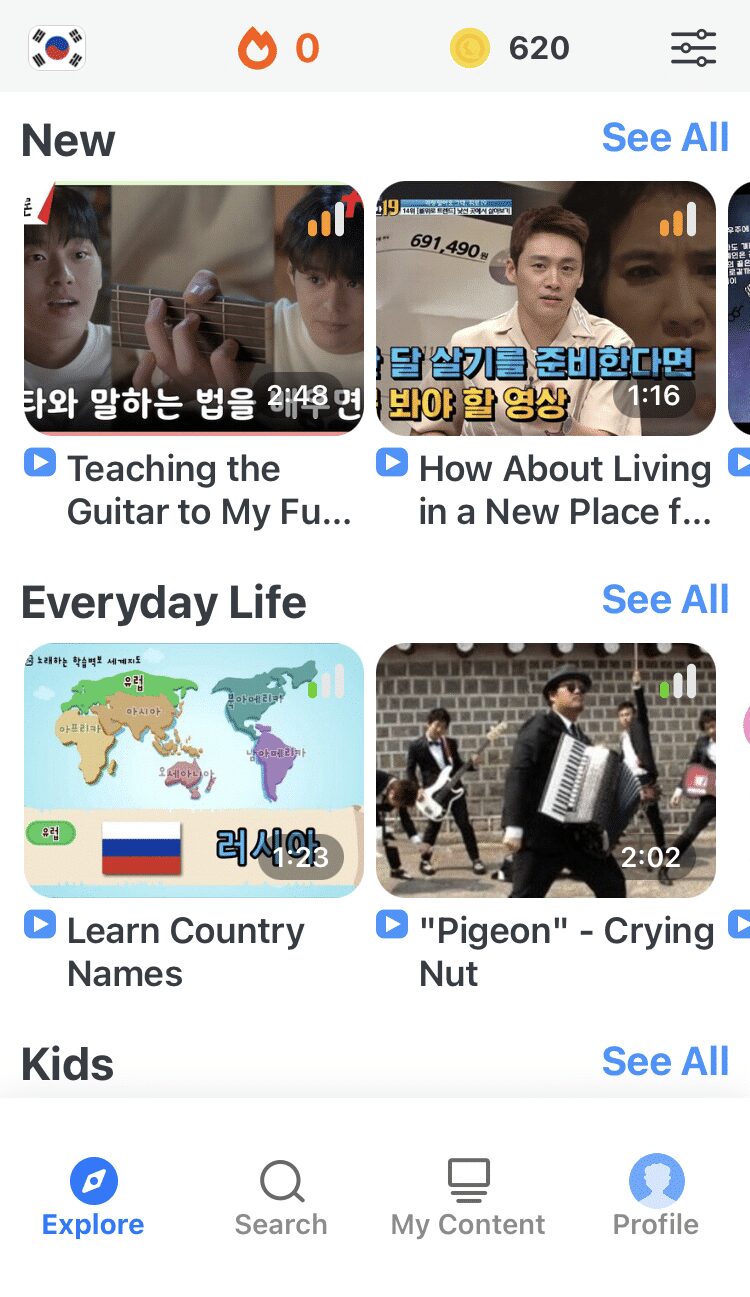
FluentU really takes the grunt work out of learning languages, leaving you with nothing but engaging, effective and efficient learning. It's already hand-picked the best videos for you (which are organized by level and topic), so all you have to do is simply choose any video that strikes your fancy to get started.
Each word in the interactive captions comes with a definition, audio, image, example sentences and more.
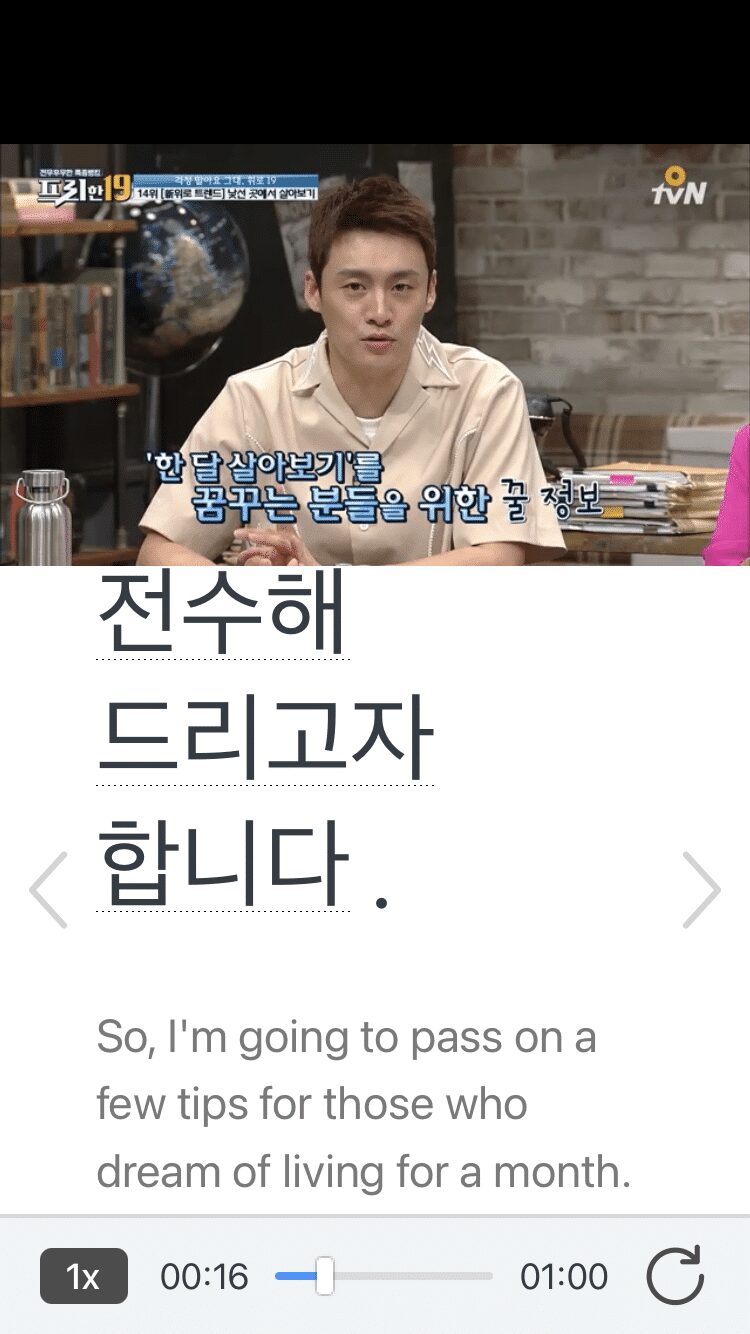
Access a complete interactive transcript of every video under the Dialogue tab, and easily review words and phrases from the video under Vocab.
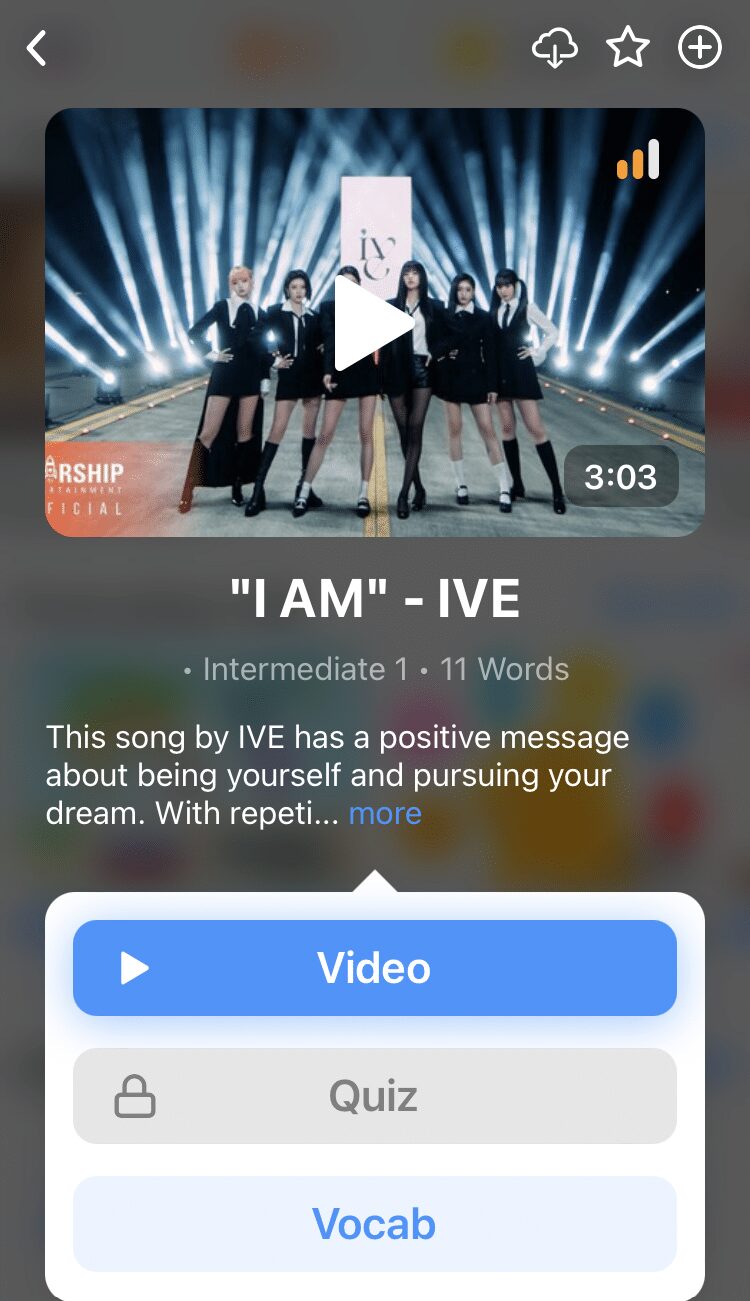
You can use FluentU’s unique Quiz Mode to learn the vocabulary and phrases from the video through fun questions.
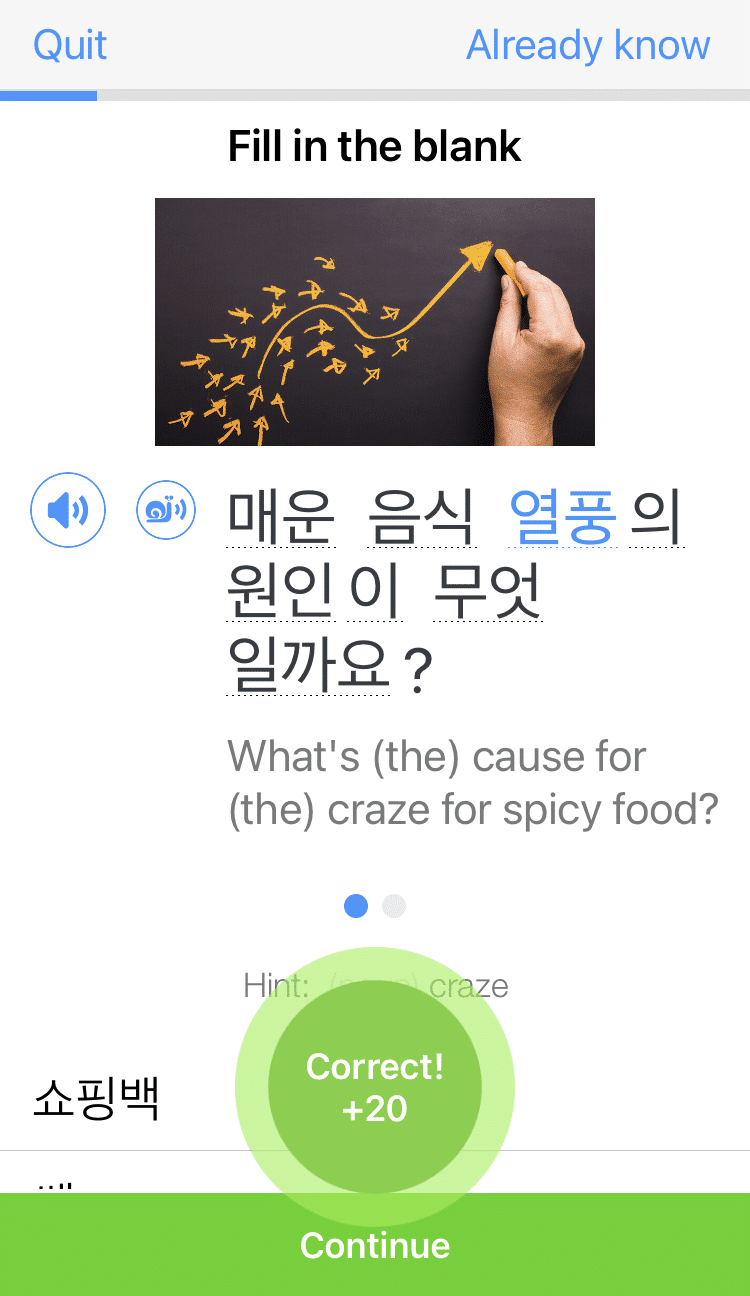
FluentU keeps track of what you're learning, and tells you exactly when it's time for review, giving you a 100% personalized experience.
Review sessions use video context to help embed the words in your memory.
Start using the FluentU website on your computer or tablet or, better yet, download the FluentU app from the iTunes or Google Play store. Click here to take advantage of our current sale! (Expires at the end of this month.)
